
Coparenting
9/13/2021
Families come in all shapes and sizes. Families may be a mother and a father, two mothers, two fathers, a single mother or a single father. Your primary family may involve aunts, uncles, or grandparents. Some children have parents who do not live in the same house either due to divorce or changes in relationships. Sometimes their family has always looked that way, and sometimes their family changes during their childhood. If your child experiences the end of a parental relationship, how do we navigate this experience with them and for them?
COPARENTING
ENDING A RELATIONSHIP
When you enter the world of coparenting, it is often because a relationship didn’t work out. The end of a romantic relationship may be amicable, or it may be contentious. Your romantic relationship didn’t work out, but two people created something amazing: your child!
The goal of coparenting is to work together to mutually raise, teach, and love your child or children. And this can happen even if you and your partner do not love each other. Even with a strained relationship, you and your partner can actively make the choice to love your child more than you dislike each other.
Is this easy to do? No, of course not! Ending a relationship brings anger, grief, hurt, and anxiety. These feelings can be very intense. These are all normal feelings. And when you are hurt, it can be much easier to show anger than kindness and compassion. We can choose to work through those emotions in healthy ways, using a therapist and coping mechanisms, and not involve your child or their relationship with their other parent.
Making the decision to end your romantic relationship is very hard for both parents. Many people stay in relationships for the children. Research shows this isn’t always the best course of action. Children benefit from having two happy and healthy parents. We are nervous our children will be damaged if your relationship ends. But children are more likely to suffer if parents are mistreating each other and they are exposed to constant dysfunction in their family.
Many older children are very observant. Research shows they feel weighed down by the issues their parents have and want the dysfunction in their house to stop. They often can feel relieved by the separation. This is not to say your child will not be upset. If your child is exposed to a strained and stressed relationship, that relationship will be a strain on them as well Your child will be worried about you. They care about us and how we are doing. They value happiness for us just like we do for them.
When you end a relationship, you can choose to stay in the relationship for the children. just in a different form. You are now a team who coparent together. And the first task of that coparenting team is to tell your children.
TELLING YOUR CHILDREN
No matter how much you prepare, this is a difficult conversation. There is no perfect time and no easy way. This conversation should take place with both parents present and should take place as soon as you the course of your relationship.
What you say and how you say it will depend on your child or children’s age, maturity, and temperament. Keep your message simple but honest. This is not a time to disparage the other parent or lay any blame on a parent.
It can help to practice what you are going to say ahead of time. The most important message to get across is that they are safe, and they are loved. Adults may change the way they love each other. Children and parents do NOT change the way they love each other. The way you and your partner’s love has changed means you will be living apart from each other. Let them know they will have two homes where they will be loved and both parents will remain part of their lives. They should know that these changes are not their fault.
Children’s reaction will depend on their age and temperament. Most children will have questions. Answer these questions as honestly as you can. Some children do not react at all immediately. Reassure your child that any emotion they are feeling whether sad, angry, hurt, or even happy is ok and normal. Some children will not discuss their feelings, but they may come out in other ways. Monitor your child for sudden changes in school performance, socialization with friends, and behavior. Also monitor for physical changes such as changes in sleep and appetite.
TRANSITIONING TO COPARENTING
Healthy Transition to Coparenting
Although this change can be hard for children, most of their painful feelings will improve over time and most children are back to normal within 2-3 years. But who can we help them during the hard time?
Most importantly, respect their other parent. LESS PARENTAL CONFLICT IS THE KEY TO HEALTHY AND HAPPY CHILDREN! Your child will fair better when both parents are involved, both are warm and loving and both provide boundaries and stability. Children who have coparents who support each other, do not bad mouth each other or undermine each other, do much better than children whose parents are unable to coparent together.
Coparenting on average takes less than 100 hours per year of interaction with your ex-partner. That is a small amount of time to keep your emotions in check and be the best possible coparent to your child. The lifelong benefits are worth the investment.
Other things you can do to help your child through this transition is
• Keep a routine as much as possible
• Let your child know they can talk to you, friends, or family
• Encourage honesty
• Let them put their feelings into words or pictures
• Legitimize their feelings
• Offer support through yourself or a counselor
• Take care of yourself and consider therapy to help you cope with your feelings
• Be patient and be kind
• Think optimistically
• Encourage your child to reach out to each parent whenever they need them or miss them, do not restrict access to the other parent.
It is also healthier for you to work hard to coparent with kindness and compassion. Treating your ex-partner in a respectful way results in less conflict and may help you move through your feelings of your relationship ending. Your emotional and physical health will benefit. Your finances will also benefit from spending less time on lawyers and the court system.
Even if you have the healthiest coparenting relationship, issues may arise. With a coparenting relationship, you must take care when addressing these issues. Do not discuss the problem in front of your child. Make sure you are using a calm and respectful tone. Do not discuss the past and avoid placing blame. Focus on the issue at hand and how it affects the child and make it clear you want to work together for the best solution.
Unhealthy Transition to Coparenting
Unhealthy coparenting is when you involve your child in the fallout of your romantic relationship. This means you may talk negatively about your ex-partner in front of them or to them. You may even try to involve them in arguments or use children as a go between.
This is not acceptable behavior and very damaging to the child. Your job is to love your child, support their relationship even if it is no longer a relationship you are involved in, and make sure they never have to decide between parents. A child should never have to “choose sides”. This behavior doesn’t punish your ex-partner, this behavior punishes your child. A child who is exposed to this type of behavior cannot determine what is true or not. Because you are speaking about their parent, they may apply what you say about your ex-partner to themselves. This is harmful and confusing for your child.
If a child is put in the middle of their parents due to poor parental behavior, they will find a way out to avoid the fighting. They will not hate the other parent, but they will hate their parents fighting and want it to end. This can damage both relationships, but often the relationship with the parent who is behaving badly. It can result in mental health issues or unhealthy coping mechanisms. It can also have long term effects on your child’s own romantic relationships because it teaches them to accept a pattern of love-hate or volatile relationships.
But what if your child is upset with their other parent? If your child is expressing feelings about the other parent, it is okay to acknowledge or validate their feelings but do not bring your experiences and feelings into the discussion. This is often seen if a parent does not fulfill their custody agreement or is unreliable. They arrive late or not show up for their scheduled times. They may not spend quality time with their children when they are with them. This needs to be addressed with the other parent but bringing your baggage into the discussion with your child will benefit no one.
The New Normal
Your life will have to adjust as your transition to a two-family household. This can be particularly hard at the beginning. The first holiday or special event may be challenging with or without your children with you. You may feel sad or like they are missing out. You may not want to celebrate the holiday at all. This is totally normal. Do what works best for you and your children. This could include skipping plans, celebrating quietly, or making a new tradition. Support your children whether they are excited, sad, or angry.
If you are new to coparenting or fresh from the end of a relationship, this may sound crazy but there are a lot of families that put feelings aside for their children and spend time together. They celebrate holidays and birthdays together. They help their child prepare to celebrate Mother’s Day or Father’s Day for their other parent. This is not for every family, but for the children who are raised in families that can prioritize the child’s experience, the benefits extended beyond the child to the whole family.
Bonus Parents
At some point, you or your coparent may enter a new relationship. Because children may be sensitive to this particular life change, you should know where this relationship is going before you involve your children. That doesn’t mean you need to be heading towards marriage, but it should be a committed relationship. When first introducing your child to your new partner, it is courteous to alert your coparent. You and your new partner should also have a frank conversation about your children, their needs and parenting schedule, your relationship with your coparent, and expectations.
The first time your child meets this person, it should be in a neutral but fun location. Keep the meeting low key and try to limit physical affection with your new partner. After the meeting, check in with the child about how they are feeling. Continue have social interactions with your child and new partner, increasing time, affection, and moving to less neutral territory.
Do NOT place expectations on your child to have a relationship with your new partner. This needs to occur naturally. A bond takes time. If may be upsetting but it isn’t your child’s problem to worry about a relationship with a new person. This doesn’t mean they can’t be friendly and respectful.
Being a bonus parent or partner can be hard! Many bonus parents are excited or worried about building a relationship with bonus children. They may turn their new partner for support. It can be upsetting for your bonus parent, but you need to support your child’s feelings and not your new partner’s feelings. If you support the bonus parent over your own child’s feelings this can lead to resentment and actually increases the chance of ruining the relationship. This is particularly important if a bonus parent or new partner comes into a teenager’s life. It is very normal to have a teen be passive or neutral to a bonus parent. This is a case of bad timing! Your teen is in a developmental stage where they are starting to pull away from their own parents. They are not invested in building a new parental relationship. Do not force it.
What can a bonus parent do? Show the child love and respect. Respect any space they need. Do not be overbearing. Do not insult or badmouth the other parent to your bonus child. Show interest in their interests. And show up to their life and important events.
What is your coparent is entering into a new relationship? Try to be respectful of their new relationship and their new partner. A healthy coparenting relationship is one that benefits the children but also the parents. You want your ex-partner to find someone who makes them happy. This benefits your child! You want this person to love and support your child. Extra love can never hurt your child and will not threaten your relationship with your child. Offer support to this person. Support them as they build a relationship with your child. Let the bonus parent know that she can tell you or ask you anything pertaining to your child. You are all part of a team now and the goal of that team is a healthy and happy child.
You do not want to badmouth this person to your child. This puts your child is the middle That behavior is not healthy and is very harmful to your child’s emotional health. Your child may come to you to discuss the bonus parent. Make sure to validate their feelings but do not express your own feelings. You can help them identify what they are feeling, why they are feeling that way, coping mechanisms they may use, and solutions to specific issues.
And if you are struggling with your ex-partner’s new relationship, it is okay to keep your distance. Distance doesn’t mean you don’t support. You are just providing healthy boundaries for yourself. Do not follow them on social media and don’t ask questions if you cannot handle the answers. You can navigate your hurt feelings without damaging your coparenting relationship and your child’s relationship with their other parent and their bonus parent. It is hard work but worth it for your child’s emotional health.
CUSTODY
Custody Agreements
Custody arrangements are the first hurdle where coparenting tends to break down. This is hurtful for parents and children. A prolonged custody battle makes it hard for parents to move on and can be psychologically damaging to children. It is your job as your child’s parent to put your feelings aside and look for ways to work together to establish what is best for your child.
Often a parent will want sole or full custody. This is very rarely granted. The court will support both parents unless one parent is proven a danger to a child, is a perpetrator of abuse, is neglectful or has serious mental or health problems.
In 2021, most custody will be split 50/50. Joint custody benefits both parents and children. Children who spend time with both parents are
• Better adjusted
• Have fewer behavioral issues
• Have less emotional or mental health issues
• Have a higher self-esteem
• Have better family relationships
• Have better school performances
Research shows that children who have relationships with both parents show the benefits above whether the parents are married or living together. This custody doesn’t need to be joint physical custody, as some families have long-distance relationships. The child-parent relationship just needs to include spending time together and this includes via phone or video meetings. This is even true with varying levels of emotional health in the parent!
Equal custody arrangements also benefit the rest of the family including mothers, fathers, grandparents, and extended family. And it has the added benefit of improving finances, the economy and equality of genders. Kentucky enacted a law that automatically requires 50/50 custody arrangements. They saw court cases drop significantly as well as domestic violence filings.
When mothers get full custody or more than 50/50 custody, they end up taking on the brunt of the logistical, emotional and time labor of raising children. It can make having a career harder and prevent upward mobility in a career. A mother who shares 50/50 custody with a partner does better financially and have been shown to do better from a personal and coparenting standpoint. It can also help financially. Single mothers or mothers with greater than 50% custody even up losing 25-50% of their predivorce income and it takes over 5 years to return to that level! Fathers also suffer similar financial losses after divorce but recover usually within a year!
Fathers that have 50/50 custody arrangements have better relationships with their children. They are also happier and healthier. They also have increased competency with parenting and have higher levels of satisfaction. Fathers who are not awarded custody are more likely to “check out” and parent less over time.
If there are all these benefits to the children and families, why are there still custody battles and hearings? Because of money! It is very profitable for the legal system to continue these battles. They often will encourage fighting even when there is not a logical reason to continue.
But what if you want sole or full custody? Unless there is a valid reason, your lawyer should discourage engaging in this battle and you should not seek this unless your child is in danger. Children whose parents seek sole custody are exposed to higher levels of conflict. This can result in problems with school, behavior, and socialization as well as physical issues.
Also, trying to get full custody often backfires! The parent who is more likely to support the child’s relationship with the other parent is the one who is “awarded” the most time in a custody arrangement. Judges are getting more impatient with pettiness and fighting and are ruling to express this frustration.
Other things that may affect custody rulings include anything that you publish on social media including Facebook and Instagram. Remember, things on the internet can live forever! Badmouthing the other parent publicly can affect the ruling in a custody hearing. This behavior can also change how your child views you and their family.
Custody Schedules
Once your custody ratio is determined, now you need to determine a schedule. The ratio should stay stable, but the schedule should be flexible. The schedule that works at a certain age may not work at an older age. Your custody schedule should be able to change and evolve over time to the benefit of your child. And older children should always get a say. They may prefer a certain schedule. Their input and wishes are very important. They should know that no matter how they want to arrange their custody schedule, it is about them and not your feelings.
Common custody schedules include:
• 7 days-7 days
o the children spend a week with each parent
o this can be a great schedule for school age or older children
• 2 days-2 days-3 day
o this requires multiple exchanges a week
o this schedule works well for children birth through 4 years as it is harder to be away from each parent for a long time
o this schedule can be hard for school age children who may leave school items at the opposite house (which can be anxiety provoking)
• 4 days-4 days-3 days -3 days
• 2 days-2 days-5 days
The best custody schedule is the one that works best for your child and your family!
To help your child transition between households have duplicates of important items such as school supplies and sports equipment. This is especially true of older children who may have midweek switches. Younger children can benefit from a calendar that helps them visualize the days they are with each parent. You can count the “number of sleeps” using stickers, stamps, or fun markers to countdown the days between exchanges.

Long distance custody agreements
Long distance custody arrangements involve two parents who live long distances from each other. These agreements need to prioritize parental involvement and the positive influence of both parents on their child. The actual schedule will be based on the age and maturity of the child and the distance between parents. These custody schedules should indicate the frequency and duration of visits with the non-primary parents as well as a calendar for holidays, vacations, and summer breaks
Younger children may need to stay with the primary care provider and have the long-distance parent travel to them. Older children will be able to handle longer stays and travel times. Teens can handle longer trips and travel but may need flexibility with sports and activities.
Some long-distance custody agreements include
• Visits every weekend (if drivable or you can afford flights)
• Visits every other weekend or 2-3 weekends/month
• Visits 1 weekend every month
• A holiday or vacation schedule for visits
o This can be helpful for families who weekend visits are not possible due to distance
o Often the long-distant parent will get custody for long weekends, school breaks, and holidays
Long-distance custody agreements should include a communication plan to ensure the long-distance parent is included in their child’s life and is up to date with all happenings. These custody agreements may require the long-distance parent to be included on school or activity email lists. The long-distance parent may request to be included in events using FaceTime or Zoom if possible.
These agreements will also outline a plan for meeting, talking, or using FaceTime or Zoom to communicate. A long-distance parent needs to be able to spend time with their child. It can be hard to not be with your child, but we are lucky to have great technology available that can allow a parent to spend time from afar. You can even plan activities during this time such as puzzles, games, cooking, or doing Legos together over a video meeting. Let your child know that despite having scheduled times, that you are available to them whenever they want to talk. And the primary care parent has the important job of making sure this relationship is supported.
Other Clauses
Custody agreements will also spell out other clauses important to your child. These may include tax related issues, college planning accounts, and health care coverage.
CUSTODY ISSUES
Schedule issues
Sometimes you will have scheduling conflicts. You may have an event you would like your children to attend, but they are with their other parent. Or you may need to provide care for the children but have a prior commitment.
Some custody agreements come with a clause called “Right of Refusal”. This means if the parent who is scheduled to be with the child can’t be with them, the other parent gets the option to care for their children rather than using other family members or a babysitter. These can be open ended or very specific to timing, how much notice is given before change in care, and certain situational changes.
When you work towards having a healthy coparenting relationship, you can handle these changes more easily without causing disruption to the child or either parent. If you need a change, call your coparent, state what change you need, apologize for disrupting their time either with or without the child, and offer to switch days, trade days, or make up the days at a certain time. When you treat your coparent with respect in these situations, you are much more likely to get the same respect back.
Custody exchanges
No parent plans to have their child away from them on a routine basis. It is sad to not have our children with you all the time. Changing your mindset about these times can help you cope with them. Remember, they are not being taken away from you! They are going to a home where they are happy and loved. They are making memories with their other parent. They are being exposed to different interests, food, and qualities. These differences expand your child’s world and experiences. You will miss them, and they will miss you, but you will see each other again. Use this time to take care of yourself so that when you are with them, you can be the best possible parent to your child.
What if your child is having a hard time going between homes or during the exchanges? You can help your child by keeping a predictable consistent routine. A consistent routine can include a special routine when they leave and when they come back that they can look forward to. Make it fun and include a favorite toy or special treat. And most importantly validate their feelings.
If your child is refusing to go, try to get your child to tell you why they don’t want to go. If needed, discuss this with their other parent. If your child has explosive behavior around exchanges, this may indicate a bigger problem that needs to be addressed.
What if your ex-partner or you refuse to exchange the child at the appointed time? Unless there is a threat to their safety, you are putting your own custody at risk. In court, this is called “gatekeeping” and is heavily frowned up and may result in a loss of custody.
RESOURCES
This is a major life change for you and your child or children. As this blog cannot be all encompassing here are a list of website and book resources that may be helpful to you and your family.
COPARENTING APPS
2HOUSES provides a calendar for custody schedules, activities, and events.
Parentship provides custom calendars, messaging, a place for digital documents, expense tracking, and custody swap request tracking.
WeParent provides custody schedules, document storage, messaging, and can post photos.
Custody Connection has custody schedule templates. IT also tracks finances and messaging. These templates and custody time calculators are admissible in court.
Our Family Wizard is a paid app that provides custody scheduling, finance tracking, and even some mediation.
coparenter uses mediators to help with custody schedules, holiday planning, expense reimbursements, and parenting time swaps. There is also a calendar and messaging features.
WEBSITES
www.thecoparentingcollective.com
www.healthychildrenofdivorce.com
www.sesamestree.org/toolkits/divorce
www.youngwomenshealth.org/divorce.html
www.youngmenshelahtsite.org/dealing_with_divorce.html
www.teenadvisor.com/divorce/teen-guide.html
www.safeteens.org/relationships/dealing-with-divorce
www.kidshealth.org/teen/your_mind/Parents/divorce.html
BOOKS
Links to the books below for kids HERE
Books for Younger Kids


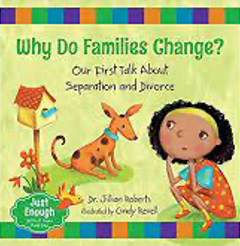
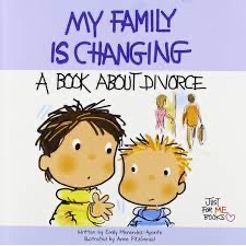


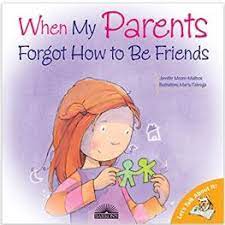
Books for Big Feelings
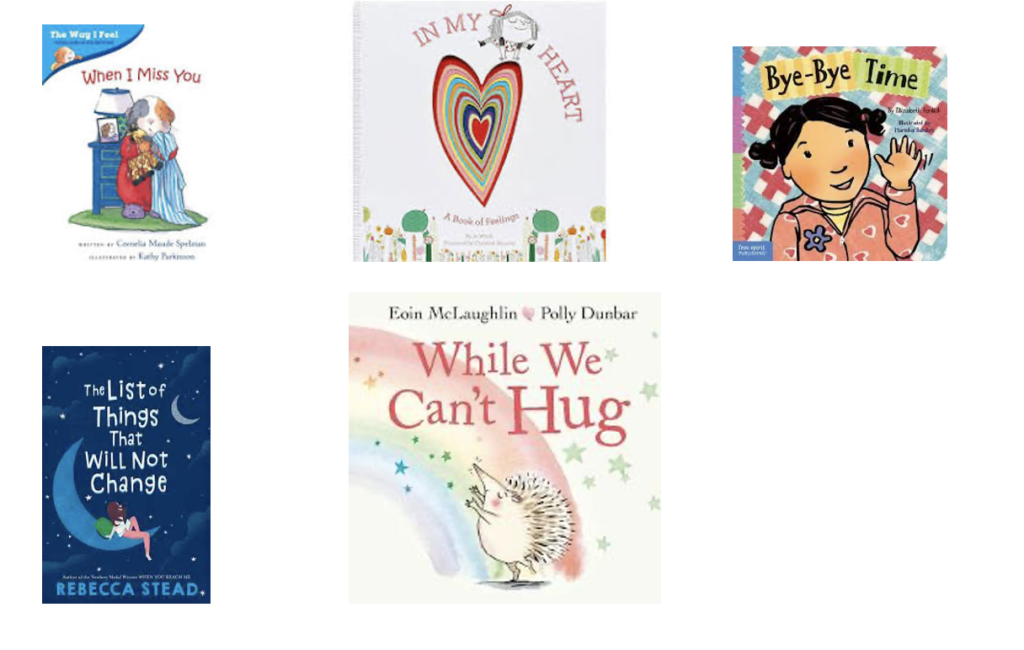
Books for Older Children
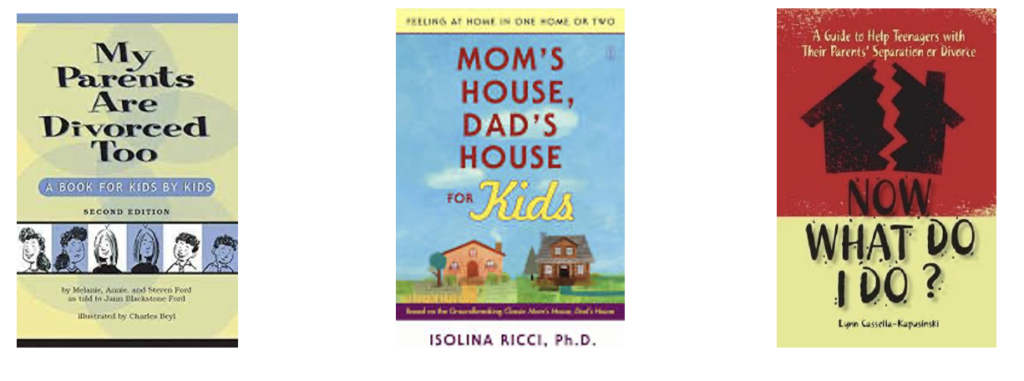

Same Sex Parenting through Divorce

Parenting a Child of Divorce
Links to the below books HERE
Coparenting Guides

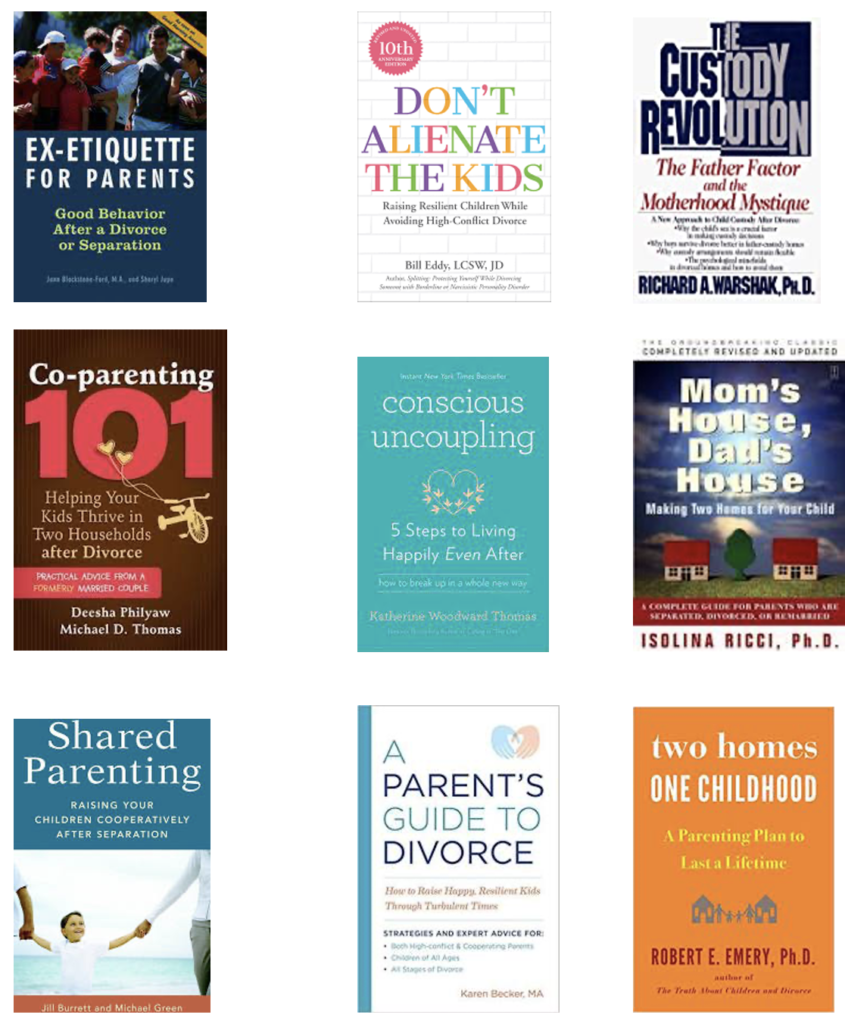
Difficult Coparenting Relationships Guides

Blended-Bonus Families
Links to the below books HERE
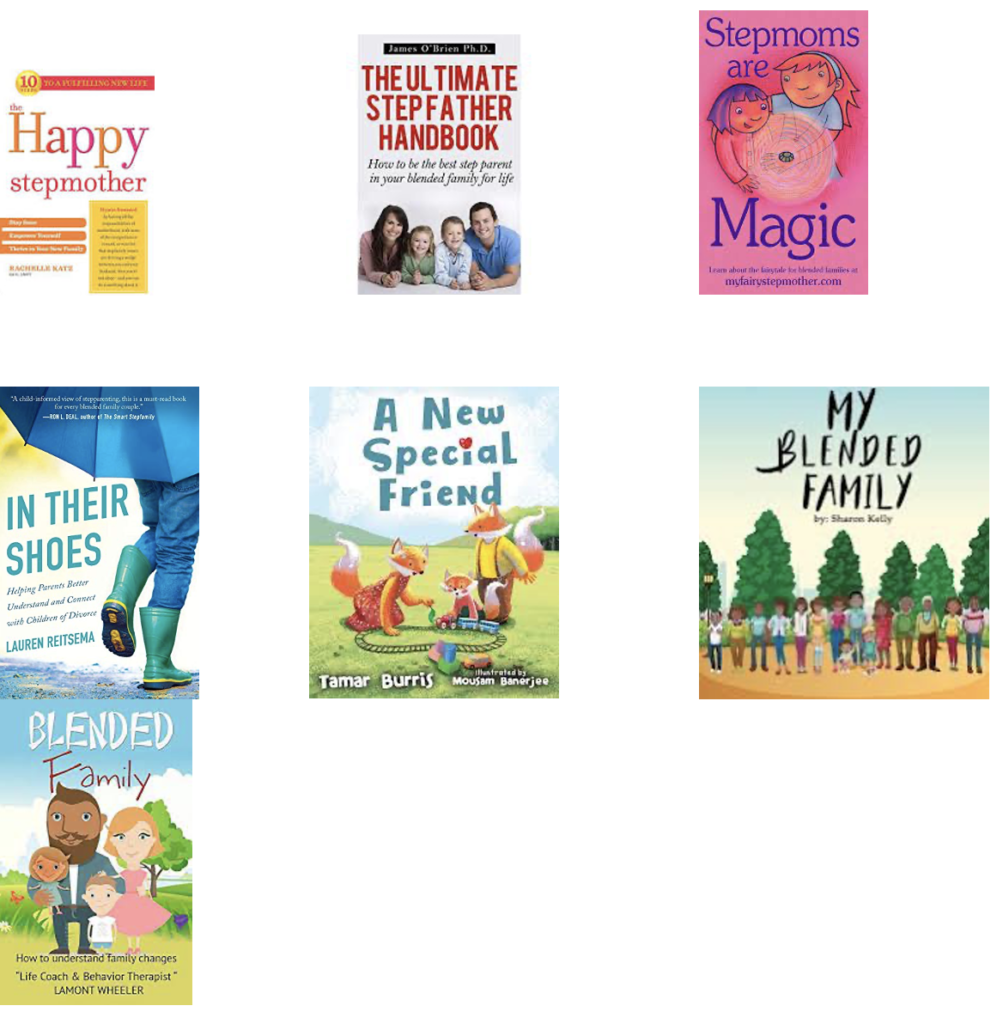
At Children’s Health Care, our priority is your child’s health and happiness. A change in relationship can be an emotion and physical stressor for your child. If you need help supporting your child through a family change, please reach out to your primary care provider.
Children’s Health Care of Newburyport, Massachusetts, and Haverhill, Massachusetts is a pediatric healthcare practice providing care for families across the North Shore, Merrimack Valley, southern New Hampshire, and the Seacoast regions. The Children’s Health Care team includes pediatricians and pediatric nurse practitioners who provide comprehensive pediatric health care for children, including newborns, toddlers, school-aged children, adolescents, and young adults. Our child-centered and family-focused approach covers preventative and urgent care, immunizations, and specialist referrals. Our services include an on-site pediatric nutritionist, special needs care coordinator, and social workers. We also have walk-in appointments available at all of our locations for acute sick visits. Please visit chcmass.com where you will find information about our pediatric doctors, nurse practitioners, as well as our hours and services.
Disclaimer: this health information is for educational purposes only. You, the reader, assume full responsibility for how you choose to use it.








